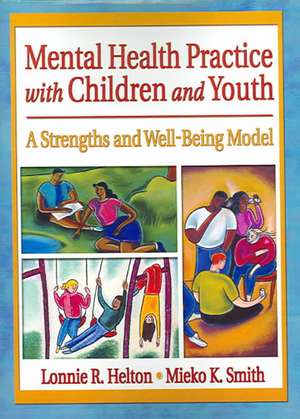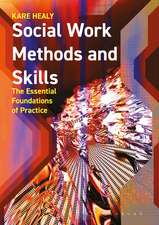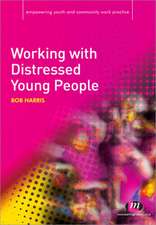Mental Health Practice with Children and Youth: A Strengths and Well-Being Model
Autor Lonnie R. Helton, Mieko Kotake Smithen Limba Engleză Paperback – 11 aug 2004
Mental Health Practice with Children and Youth: A Strengths and Well-Being Model presents new insights into successfully working with children by concentrating on their capabilities and resilience. This book explores the continuum of children’s needs and challenges from early childhood through adolescence. This text also supports child-centered and strengths-oriented approaches to intervention with children and introduces specific strategies for maximizing pro-social behaviors, self-concept, learning, and positive peer relationships in children at home, at school, and in the community.
Mental Health Practice with Children and Youth shows how children’s rights have slowly evolved over many years, from children’s status as property in the 1600s to the twentieth-century innovations that give a child a specific legal status with a certain amount of freedom and self-determination. By emphasizing the self-concept and self-esteem guidelines outlined by this book, social workers, mental health specialists, and childcare professionals can help children transition into healthy adults, despite hardships, disabilities, or parent negligence. Chapters highlighting interview and assessment techniques as well as media-directed, creative child therapies will enhance your counseling and intervention practices.
Mental Health Practice with Children and Youth provides you with insight on:
- the relationships between children and family environment—from two-parent families to foster families
- child socialization and peer relationships—in school and around the community
- adolescence—gender roles, ethnic and racial diversity, sexual orientation, and adult transitioning
- educational needs—teacher expectations, special education, diversity, home schooling
- and more!
Preț: 218.04 lei
Preț vechi: 274.23 lei
-20% Nou
Puncte Express: 327
Preț estimativ în valută:
41.74€ • 45.35$ • 35.08£
41.74€ • 45.35$ • 35.08£
Carte tipărită la comandă
Livrare economică 21 aprilie-05 mai
Preluare comenzi: 021 569.72.76
Specificații
ISBN-13: 9780789015754
ISBN-10: 0789015757
Pagini: 268
Dimensiuni: 148 x 210 x 17 mm
Greutate: 0.5 kg
Ediția:New.
Editura: Taylor & Francis
Colecția Routledge
Locul publicării:Oxford, United Kingdom
ISBN-10: 0789015757
Pagini: 268
Dimensiuni: 148 x 210 x 17 mm
Greutate: 0.5 kg
Ediția:New.
Editura: Taylor & Francis
Colecția Routledge
Locul publicării:Oxford, United Kingdom
Cuprins
- Acknowledgments
- Chapter 1. The Strengths and Resilience of Children
- The Strengths Perspective
- The Strengths of Children
- Defining Resiliency
- Development of Resiliency
- Conceptual Model of Resiliency
- Person-Environmental Transaction for the Development of Resiliency
- Conclusion
- Strengths Story: Henry Lester
- Questions for Discussion
- Chapter 2. The Care of Children in American Society: Historical Events and Trends
- Early Perceptions and Treatment of Children
- Nineteenth-Century Efforts for Change
- Twentieth-Century Innovations
- Child Welfare Practice
- Conclusion
- Strengths Story: Cynthia Harper
- Questions for Discussion
- Chapter 3. Children and Family Relationships
- Children in Biological Families
- Children in Single-Parent Families
- Children in Blended Families
- Children in Gay and Lesbian Families
- Children in Multigenerational Families
- Children in Foster Families
- Children in Adoptive Families
- Children in Residential Settings
- Conclusion
- Strengths Story: Joanna Brown
- Questions for Discussion
- Chapter 4. Child Socialization and Peer Relationships
- Family Influences on Socialization
- School and Peer Relationships
- Children in the Community
- Conclusion
- Strengths Story: Billy Lapahie
- Questions for Discussion
- Chapter 5. Children and Learning
- Teacher Expectations and Learning
- Elements of Learning and Achievement
- Ethnic and Culturally Different Children
- Children and Special Education
- Home Schooling: An Educational Alternative
- Conclusion
- Strengths Story: Hannah Carter
- Questions for Discussion
- Chapter 6. Self-Concept and Self-Esteem
- Self-Esteem and Well-Being
- A Case Scenario of Resilience
- Conclusion
- Strengths Story: Michiko Tanaka
- Questions for Discussion
- Chapter 7. Adolescence
- Adolescent Ethnic and Racial Identity
- Gender Roles
- Adolescents and Sexual Orientation
- Transitions to Adulthood
- Conclusion
- Strengths Story: Zor Hollis
- Questions for Discussion
- Chapter 8. Child-Centered Practice Approaches: Emphasis on Strength and Resilience
- Guidelines for Interviewing and Assessing Children
- Guidelines for Interviewing and Assessing Adolescents
- Practice with Children in Child Welfare
- School Social Work and Counseling in School
- Mental Health Services for Children and Adolescents
- Conclusion
- Strengths Story: Ina Abrams
- Questions for Discussion
- Chapter 9. Media-Directed, Creative Child Therapies
- Play Therapy
- Drawing and Art Therapy
- Puppet Therapy
- Clown Therapy
- Bibliotherapy
- Music Therapy
- Collaboration with Parents
- Conclusion
- Strengths Story: Helen McGuire
- Questions for Discussion
- Chapter 10. Evidence-Based Practice and Research for Promoting Children’s Strengths
- Introduction
- Resilience-Based Programs
- Conclusion
- Strengths Story: Charles Elliott Maples
- Questions for Discussion
- Chapter 11. Empowerment of Children in the Global Arena
- United Nations Convention on the Rights of the Child
- International Adoptions
- A Case Scenario of International Adoption
- Conclusion
- Strengths Story: Antun (Tony) Boskovich
- Questions for Discussion
- Epilogue
- Index
- Reference Notes Included
Notă biografică
Helton, Lonnie R.; Smith, Mieko Kotake
Descriere
Mental Health Practice with Children and Youth: A Strengths and Well-Being Model presents new insights into working with children and adolescents by concentrating on their capabilities and resilience to help them to empower themselves. This book explores specific strategies for maximizing children's self-concept, learning, pro-social behaviors, and positive peer relationships in the home, in school, and in the community. Augmented with case studies, empirical findings, and questions for discussion in every chapter, this text will help mental health and community service practitioners as well as university faculty and students better serve the younger clients in their work.

















